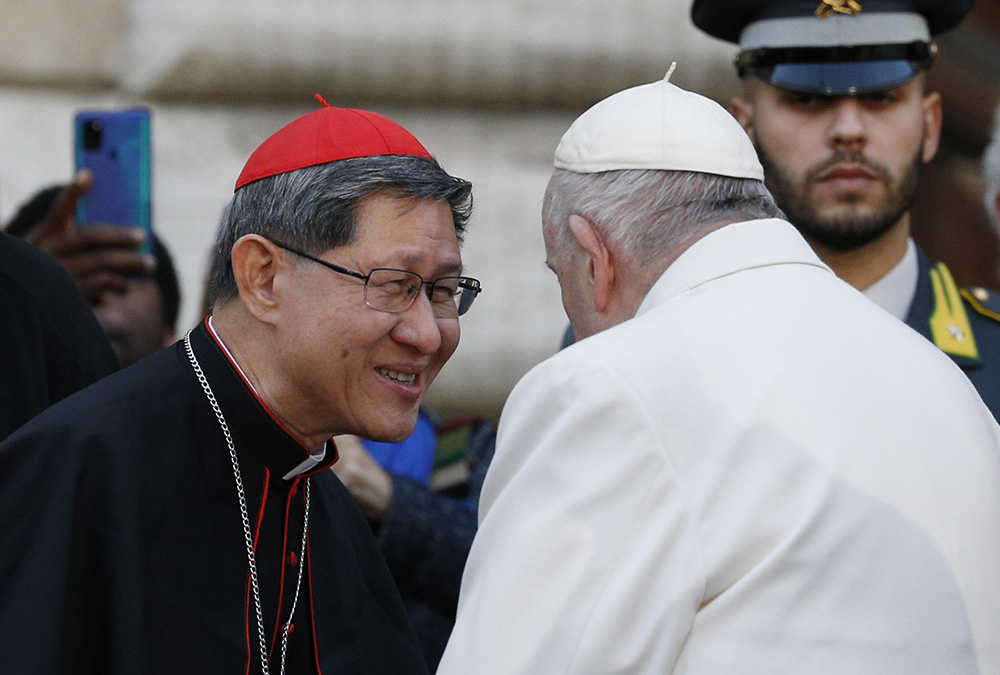
Pope Francis talks with Cardinal Luis Antonio Tagle after praying in front of a Marian statue at the Spanish Steps in Rome Dec. 8, 2022, the feast of the Immaculate Conception. (CNS/Paul Haring)
Cardinal Luis Antonio Tagle suggested that pockets of resistance to Pope Francis' invitation to synodality within the global Catholic Church is rooted in fear of change and insecurity about Catholic identity.
"Maybe we need to individually and as communities really confront the forces of resistance," the Filipino prelate said in a recorded discussion with Holy Cross Fr. Stephen Newton, executive director of the Association of U.S. Catholic Priests.
The recording was played June 14 during the association's 12th annual assembly at the University of San Diego.
Tagle, pro-prefect for the evangelization department within the Vatican's Dicastery for Evangelization, had planned to address the assembly in person but changed plans when the pope asked him to attend the third National Eucharistic Congress of the Catholic Church in Congo, which ran June 4-11.
The U.S. priests' four-day assembly is focusing on the issue of synodality in the church and the role of clergy and laypeople in promoting listening and collaboration in response to the pope's invitation.
Tagle voiced strong support for the continuing three-year synodal process, which is preparing for the first of two meetings of the Synod of Bishops Oct. 4-29. A second session is scheduled for October 2024.
Tagle said experience has taught him that fear of change can limit how the church responds to the needs of the world and works to further keep communities separated rather than unified. He expressed concern for the temptation to use faith-related matters to support ideology rather than Catholic teaching.
Advertisement
"Where there is that insecurity about our identity, the tendency is to define clear parameters, clear boundaries in order to distinguish who I am over and against the others," he said.
"Imagine how an attitude of fear and insecurity would stop all links of communion, all dialogue, all listening processes. Those will be threatening activities," he added.
The Second Vatican Council established the framework from which the current discussion of synodality in the church has emerged under Francis, Tagle explained, saying that "my vision for a synodal church is a church that rediscovers this wonderful gift of the Spirit given to the whole church in Vatican II."
"It really, in a way, pains me and shocks me," Tagle said of efforts to undermine the synod. "I don't want to judge people. But sometimes I just wish people would calmly, calmly read the documents of Vatican II and get in touch with the teachings of Vatican II rather than rely on some caricatures or biased presentations for what Vatican II stands for."
The 45-minute discussion also touched on the importance of cultural sensitivity within the church and the need for greater recognition by clergy that they alone do not possess all the talents necessary to effectively manage the church.
"We don't have to imitate each other," he said. "We can be who we are as gifted by God and share each other's gifts. For me, it's a church that celebrates the many, many gifts. There's an exchange of gifts, not for personal gain, but for service."
In reflecting on his role as a cleric in promoting synodality, he said it was necessary to realize that his calling is one of service, "not a rank, not like a cultural social position higher than the rest of humanity." The goal is to walk with others in the church, not separately, he said.
"If we could start with that, that the priest becomes servant, celebratory rather than looking always harassed. You thrive in a community. You are the first to see how much the Lord loves the community, to see how gifted they [community members] are."







